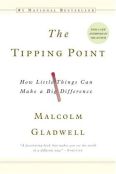From The Tipping Point by Malcolm Gladwell:
We are actually powerfully influenced by our surroundings, our immediate context, and the personalities of those around us. Taking the graffiti off the walls of New York’s subways turned New Yorkers into better citizens. Telling seminarians to hurry turned them into bad citizens. The suicide of a charismatic young Micronesian set off an epidemic of suicides that lasted for a decade. Putting a little gold box in the corner of a Columbia Record Club advertisement suddenly made record buying by mail seem irresistible. To look closely at complex behaviors like smoking or suicide or crime is to appreciate how suggestible we are in the face of what we see and hear, and how acutely sensitive we are to even the smallest details of everyday life. That’s why social change is so volatile and so often inexplicable, because it is the nature of all of us to be volatile and inexplicable.
But if there is difficulty and volatility in the world of the Tipping Point, there is a large measure of hopefulness as well. Merely by manipulating the size of a group, we can dramatically improve its receptivity to new ideas. By tinkering with the presentation of information, we can significantly improve its stickiness. Simply by finding and reaching those few special people who hold so much social power, we can shape the course of social epidemics. In the end, Tipping Points are a reaffirmation of the potential for change and the power of intelligent action. Look at the world around you. It may seem like an immovable, implacable place. It is not. With the slightest push–in just the right place–it can be tipped.

